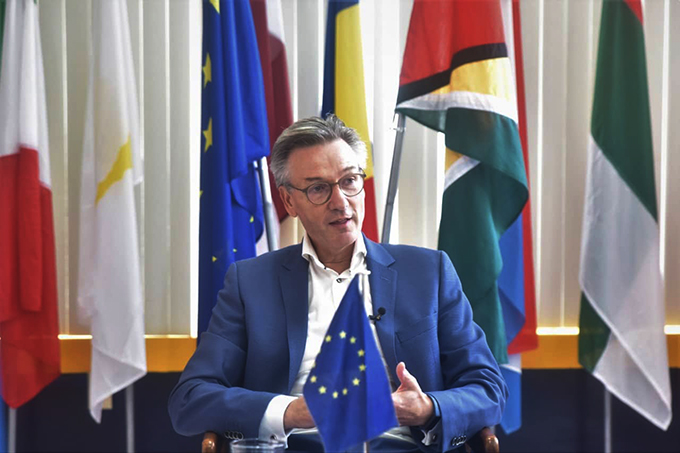Guyana’s burgeoning oil revenues and robust forecasts of Gross Domestic Product (GDP) growth have resulted in the European Union (EU) making the decision to decrease funding to the country.
“So yes, the amount of money will be less and the higher the GDP of Guyana, the less you will get. The money has been fixed for the coming four years. That is less than it was before and that reflects the progress that you’re making,” new EU Ambassador, Rene van Nes yesterday explained when asked by the Stabroek News if the EU’s budgetary support will decrease because of Guyana’s oil revenues.
While he did not give a breakdown for each year, the Ambassador told a press conference that for the next four years, €20 million has been earmarked for this country, but it comes with a plan to generate additional revenue from private sector and other investment initiatives.
“One of the new instruments that the European Commission is using worldwide is, and I will use the words of the Director General when he says, official development assistance (ODA) is not the engine that makes a country move forward. It is, at best, the oil in the engine,” van Nes reasoned.
“The engine is what the private sector will bring in its foreign direct investment. And so can we use part of our resources to bring into leverage the private sector? Can we bring in with, let’s say, a few million euros of development assistance? Can we bring in a multitude of that in terms of loans, in terms of guarantees, in terms of foreign direct investments? So that is the model. That’s not only in Guyana, but what the EU is applying now worldwide,” he added.
The strategy, according to the ambassador, is a part of its Global Gateway initiative to boost smart, clean and secure links in digital, energy and transport sectors and to strengthen health, education and research systems across the world.
The EU’s website explains that it stands for “sustainable and trusted connections that work for people and the planet, to tackle the most pressing global challenges, from climate change and protecting the environment, to improving health security and boosting competitiveness and global supply chain.”
In 2020, then EU Ambassador, Fernando Ponz Cantó, had said that although Guyana is the newest oil producing state, it still needed monetary support as a means to “bridge” fiscal requirements before oil revenue is available.
In December of last year, the government had announced the receipt of a final tranche of €7.56 million ($1.7
billion) in budgetary support from the EU, even as President Irfaan Ali reminded that the country is still a developing one and will need all the financial aid it can muster until it fully transitions to an oil state.
“There is a serious misconception in relation to Guyana being [an oil state].Yes, we are a new player in oil and gas. Yes, we are projected to grow tremendously and be a leading economy globally, but there is a transition time which brings with it a transition gap,” Ali had said when the €7.56 million in budgetary support was announced.
“We are making the case that in that transition gap, Guyana still qualifies for concessional financing. We still qualify for support from international agencies because the strong flow of revenue from the oil and gas sector would not occur immediately. We still believe strongly that we qualify for support,” he added.
EU’s Deputy Managing Director for the Americas, Javier Nino Pérez, had then announced that while bilateral aid would stop for some countries, Guyana would not fall into that category. “Even though for other countries we will not foresee bilateral programmes in the next several years, this will not be the case for Guyana. Guyana will continue to benefit from a national programme,” Pérez informed.
He stated also that the EU was impressed with Guyana’s management of the funding it has received over the years and this is one of the reasons that the two sides are currently in discussions on another agreement.
Ambassador van Nes yesterday said that he does not foresee lower financial aid being of worry because the monies earmarked will have a huge impact on the relations of the two countries, ,as they work to empower the citizens of their nations. “I don’t think that is a problem,” he reasoned.
He played up the benefits the relationship of the two countries, even as he also noted that for some countries the assistance this country receives far outweighs theirs.
“Not only on the amount of resources, will it have a huge impact on our relation. I think that relationship will evolve. That relationship will be different, and that’s good. It’s, I think, it evolves from a relationship where the EU was funding, sort of developing projects, to a relationship of genuine partnership. And that’s what I tried to illustrate,” he said as he pointed to three broad areas he had explained would be developed.
A trained economist, van Nes underscored that the twenty millions euros set aside will only grow as part of overall development plans for the partnership between this country and the EU.
“We have 20 million euros for the coming four years. That excludes what we hope to achieve through this leveraging mechanism. So actually, we hope that we will be able to leverage a lot more money, if we can get the private sector and our European Investment Bank, other international financial institutions, to come in and to use part of that money. So we hope to actually expand that, if we’re successful in creating such arrangements,” he stated.






